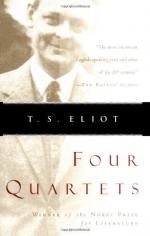
|
| Name: _________________________ | Period: ___________________ |
This test consists of 5 short answer questions, 10 short essay questions, and 1 (of 3) essay topics.
Short Answer Questions
1. The speaker says that "each venture / Is a new" what in Part V of "East Coker"?
2. In what way does the world move, according to the final three lines of Part II of "Burnt Norton"?
3. Which of the following is found at the still point of the world, as described in Part II?
4. What is said to be "not here" in this "twittering world" in the "Burnt Norton"'s third part?
5. The speaker questions whether or not who had "deceived us / Or deceived themselves" in Part II of "East Coker"?
Short Essay Questions
1. Why is the final sentence of "East Coker" an inversion of the first sentence?
2. What does the speaker mean in Part II of "Burnt Norton" when he states at the still point of the turning world, "there the dance is, / But neither arrest nor movement"?
3. Why is it said by the speaker in "Burnt Norton"'s second part that "the enchainment of past and future / Woven in the weakness of the changing body, / Protects mankind from heaven and damnation / Which flesh cannot endure"?
4. What are the other echoes which inhabit the rose-garden in Part I of "Burnt Norton"?
5. What is signified by the statement "Distracted from distraction by distraction" in "Burnt Norton"'s third part?
6. What is the significance of the dark, mentioned repeatedly at the beginning of Part III of "East Coker," into which "they" all go?
7. What does the speaker mean by saying in Part V of "Burnt Norton" that love is caught "in the form of limitation"?
8. Why does the speaker claim in Part II of "Burnt Norton" that "To be conscious is not to be in time"?
9. What is an interpretative possibility for the scene the speaker describes in the open field in the first part of "East Coker"?
10. What is meant by the "intolerable wrestled / With words and meanings" in the second part of "East Coker"?
Essay Topics
Write an essay for ONE of the following topics:
Essay Topic 1
In a critical essay, evaluate the meaning and significance of the following lines:
"Only a flicker
Over the strained time-ridden faces
Distracted from distraction by distraction
Filled with fancies and empty of meaning
Tumid apathy with no concentration"
Specifically, what is being conveyed by these lines? What is the meaning of each line? What does each line demonstrate about the condition of the human person? What do they demonstrate about human nature? How is this conception important to the interpretation of The Four Quartets? Against what is modern man struggling?
Essay Topic 2
Compose an expository essay on the nature of poetic imagery, using Eliot's Four Quartets as an example. What is imagery? What is the purpose of imagery? How is imagery commonly used in poetry? What are some specific examples of poetic images? What are metaphorical images? What are some examples of metaphorical images in The Four Quartets? What are the literal significations of such images? What are their non-literal significations? How does one interpret their meaning? How are they important for interpretation of the meaning of the poem? What do they uniquely contribute to the poem?
Essay Topic 3
Time is one of the three major components of The Four Quartets, and is pondered, questioned, and considered throughout the four poems. Of particular importance in Part I of "Burnt Norton" is the consideration the speaker makes of the past, particularly its relationship to possibility. Analyze this relationship in a thoughtful essay. What is time? What are the two distinct notions of time which Eliot considers throughout the poems? What is the past? How does the past relate to the present and to the future? How does one speak of the possibilities of the past? How does the past influence the possibilities of the present and the future? What images are associated with the past and its perceived and unperceived possibilities?
|
This section contains 1,165 words (approx. 4 pages at 300 words per page) |

|




